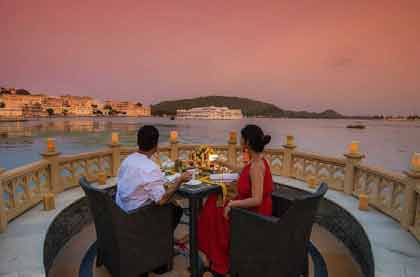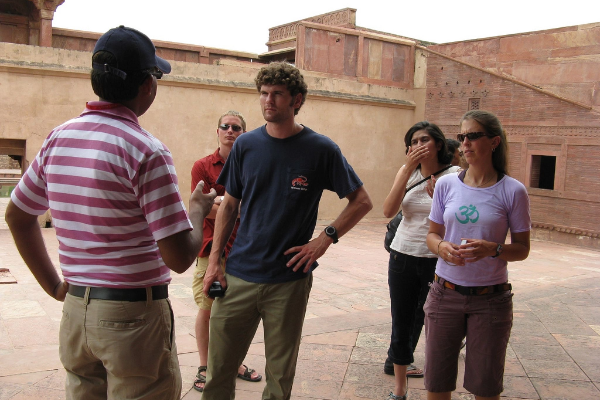
ATTRACTIONS & PLACES TO VISIT AND EXPLORE IN JAIPUR
Planned by Vidyadhar Bhattacharya, Jaipur holds the distinction of being the first planned city of India. Renowned globally for its coloured gems, the capital city of Rajasthan combines the allure of its ancient history with all the advantages of a metropolis. The bustling modern city is one of the three corners of the golden triangle that includes Delhi, Agra and Jaipur.
The story goes that in 1876, the Prince of Wales visited India on a tour. Since the colour pink was symbolic of hospitality, Maharaja Ram Singh of Jaipur painted the entire city pink. The pink that colours the city makes for a marvellous spectacle to behold. Jaipur rises up majestically against the backdrop of the forts Nahargarh, Jaigarh and Garh Ganesh Temple.
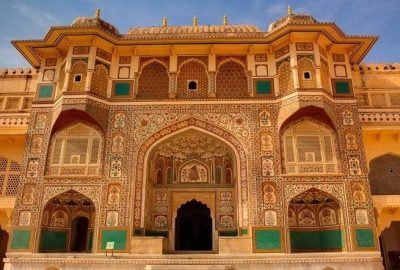
AMBER PALACE
Amber (pronounced Amer) is at a distance of about 11 kilometres from Jaipur. Now a UNESCO World Heritage Site, it was the bastion of the Kachwahas of Amber, until the capital was moved to the plains, to what is today Jaipur.
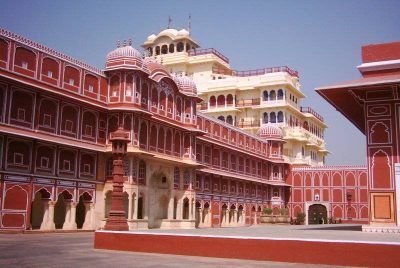
AMBER PALACE
Located deep within the walled city, the City Palace Complex was conceived and built by Maharaja Sawai Jai Singh II, the founder of Jaipur. A beautiful fusion of Mughal and Rajput architecture.the palace is still home.
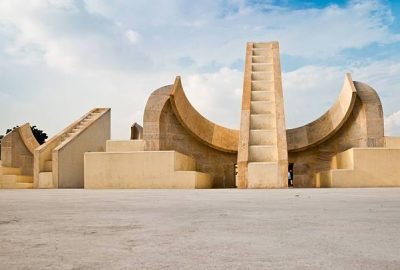
JANTAR MANTAR
Now a UNESCO World Heritage Site, Jantar Mantar in Jaipur is considered to be the largest of the five astronomical observatories built by Maharaja Sawai Jai Singh II, the founder of Jaipur.It contains sixteen geometric devices.
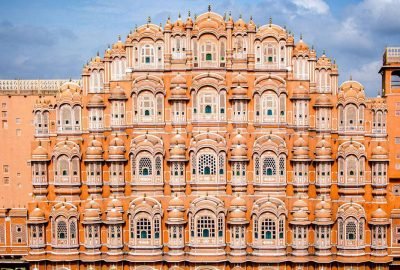
HAWA MAHAL
Hawa Mahal, literally the Palace of Winds, was built in 1799 by the poet king Sawai Pratap Singh as a summer retreat for him and his family. It also served as a place where the ladies of the royal household.
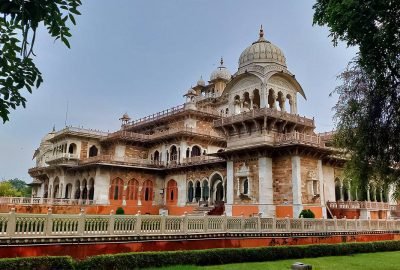
ALBERT HALL MUSEUM
The building gets its name from The Victoria and Albert Museum in London, the inspiration for its design. The exquisitely built Albert Hall is housed in the centre of Ram Niwas Garden.It also houses a large.
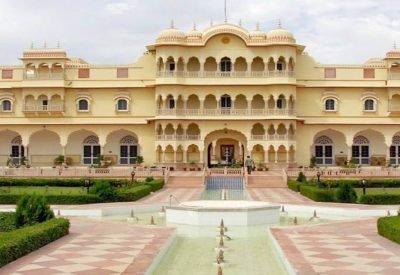
NAHARGARH FORT
Nahargarh Fort sits proudly on a ridge of the Aravalli Hills, creating an impressive northern backdrop to the city of Jaipur. It was constructed during the reign of Jai Singh in 1734, and was later expanded in 1868.
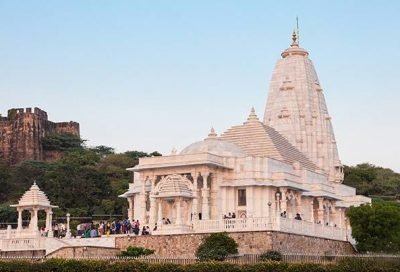
BIRLA TEMPLE
The Lakshmi-Narayan Temple, or the Birla Temple, as it is more popularly known as, is located at the base of Moti Dungari. Built on an elevated platform this comparatively modern temple is built entirely of white marble.
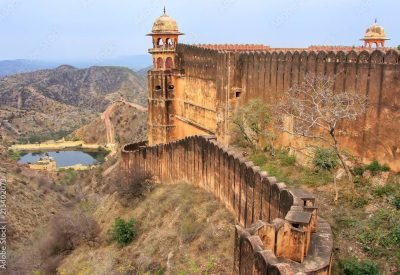
JAIGARH FORT
About 15 kilometres from Jaipur, Jaigarh Fort was built by Sawai Jai Singh II sometime in the early 18th century amidst the arid, rocky and thorn-scrub covered hills. Despite its ancient construction.
Things To Do
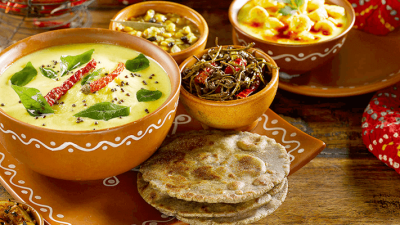
FOOD
Panghat packs dinner and traditional entertainment together, in a cocktails and Tandoori fare at the Taj Rambaghs amphitheater. Suvarna, also at Rambagh, is a multi-cuisine restaurant.Lakshmi Misthaan Bhandaar, popularly known as LMB, gives you Rajasthan on a plate including their renowned ghewar.
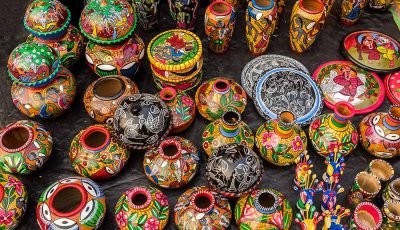
SHOPPING
Jaipur is famous for its lacquer jewelry, painted with enamel, encrusted with kundan, sell lacquer jewelry. Precious and semi-precious stones including garnets, emeralds, rubies, topaz and amethyst are also very popular with tourists. Tie-and-dye work on silk and crepe and the Sanganer block prints specialties.
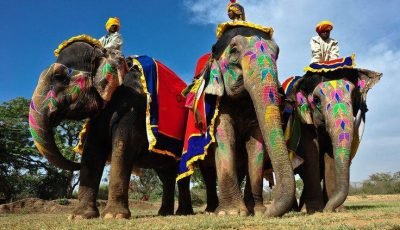
ENTERTAINMENT
The Gangaur fair, dedicated to the Goddess Gauri, is celebrated in the months of April and March. Theres a lot of singing, dancing and processions with colourful costumes.The Elephant Festival during March is awesome with its games of elephant polo and tug-of-war sessions between the animals and men.
Best of Ajmer
THE AJMER SHARIF DARGAH
This is a Sufi shrine which encloses the ‘maqbara’ (grave) of Garib Nawaz, the Sufi saint Khwaja Moinuddin Chisti. Built in the 13th century, the shrine is popular among people of all faiths who flock here to have their prayers answered. The shrine has three gates – the main gate or the Nizam gate, the Shah Jahan gate erected by the Mughal Emperor and the Buland Darwaza. Another big draw at this holy shrine is the sacred and scrumptious food that is served to devotees. Cooked in giant cauldrons known as ‘degs’, devotees gather in throngs to be blessed by this prasad.
ATTRACTIONS & PLACES TO VISIT AND EXPLORE IN AJMER
Best of Ajmer
ADHAI DIN KA JHONPDA
Adhai Din Ka Jhonpda was first constructed as a Sanskrit college, but Sultan Ghori subsequently transformed it into a mosque in 1198 AD. The edifice, an exceptional example of Indo-Islamic architecture, was subsequently embellished by Sultan Iltutmish in 1213 AD. According to legend, the mosque was the site of a two-and-a-half-day fair held during Urs in the 18th century, which is why it is known as Adhai din ka Jhonpda (literally, The Hut of Two and a Half Days).
Best of Ajmer
ADHAI DIN KA JHONPDA
Adhai Din Ka Jhonpda was first constructed as
a Sanskrit college, but Sultan Ghori
subsequently transformed it into a mosque in
1198 AD. The edifice, an exceptional example
of Indo-Islamic architecture, was subsequently
embellished by Sultan Ilfutmish in 1213 AD.
According fo legend, the mosque was the site
of a two-and-a-half-day fair held during Urs in
the 18th century, which is why it is known as
Adhai din ka Jhonpda (literally, The Hut of Two
and a Half Days).
Best of Ajmer
SONIJI KI NASIYAN
The Soniji ki Nasiyan, popularly known as the Ajmer Jain Temple, honours Risabh or Adinath and is a superb example of elaborate building. It has a red stone entryway and a marble stairway within that is inlaid with carvings of the saintly Tirthankars, omniscient Jain masters who propagated morality. This temple, built in the late 19th century, is one of India’s wealthiest temples. Swarna Nagari, the main room, is appropriately titled the “City of Gold” since it has several wooden figurines that have been gold-plated. In his book “Jainism: A Pictorial Guide to the Religion of Non-Violence,” Kurt Titze makes reference to this renowned architectural masterpiece.
Best of Ajmer
KISHANGARH FORT
In Kishangarh, Rajasthan, there is a stunning fort called Kishangarh Fort. When one visits the fort, they will find prisons, granaries, armies, and other key structures there. The largest building there is called the Durbar Hall, and it was where the monarchs held daily formal sessions. The Phool Mahal, which is decorated with exquisite paintings and frescoes, is without a doubt the fort’s most beautiful location. It brilliantly displays the splendour of the Rathore clan’s monarchs. Several lakes, including Gundu Lav Talab and Hamir Sagar, are close to the fort and make wonderful picnic spots. if you wish to go back in time.
Best of Ajmer
KISHANGARH FORT
In Kishangarh, Rajasthan, there is a
stunning fort called Kishangarh Fort.
When one visits the fort, they will find
prisons, granaries, armies, and other key
structures there. The largest building there
is called the Durbar Hall, and it was where
the monarchs held daily formal sessions.
The Phool Mahal, which is decorated with
exquisite paintings and frescoes, is
without a doubt the fort’s most beautiful
location. It brilliantly displays the
splendour of the Rathore clan’s monarchs.
Several lakes, including Gundu Lav Talab
and Hamir Sagar, are close to the fort and
make wonderful picnic spots. if you wish
to go back in time.
Best of Ajmer
AJMER GOVERNMENT MUSEUM
One of the most popular tourist attractions in Ajmer is the government museum. The museum is located inside the opulent fortified palace of the fabled Mughal Emperor Akbar, which was constructed in 1570. The museum, also called the Bharatpur Museum, houses a substantial collection of artefacts from antiquity.
Best of Ajmer
VICTORIA CLOCK TOWER
Ajmer is a city that has seen major influence from the British in its past. The British left their legacy in many forms in Ajmer, some of which are in the form of educational institutions and architectural buildings in the city. While a couple of these buildings are located in the heart of Ajmer, one that immediately catches the eye of the visitor is the Victoria Jubilee Clock Tower. Located just opposite the railway station in Ajmer,
For Bookings Of Travel Packages, Car Rental & Luxury Hotels.
HOW TO GET HERE?

Airplan
Jaipur International Airport is well connected by air.

Train
Jaipur Junction is well connected by rail with rest of the country.

Road
Jaipur is well connected by a network of State.



